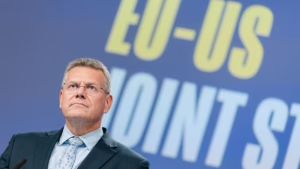In the past few days, there have been reports in US media suggesting that billionaire Elon Musk may step down from his role in Trump’s administration. This comes after his highly publicized tenure as the unofficial head of DOGE (Department of Government Efficiency) and involvement in various political initiatives, most recently his campaign for a conservative judge in Wisconsin, which did not go well.
It is uncertain how and when Musk will leave, but one thing is clear: He will have a lasting impact that goes beyond the disruptions caused by his invention, DOGE. Musk has introduced highly toxic and cynical politics from the depths of the internet into the corridors of power in the world’s leading superpower through his behavior online and offline.
A perfect example of this is his Nazi salute at an event following Trump’s inauguration on January 20. Musk immediately dismissed the claims of the gesture, responding with Nazi-themed jokes on his account, demonstrating clear “trolling” behavior.
Trolling is a common practice of those in fringe online spaces where toxic and cynical political views dominate. Musk has shown sympathy for the notorious website 4chan, which is infamous for its culture of anonymity and the spread of extreme politics. Just this year, he changed his account name to “Kekius Maximus” and used a Pepe the Frog image as his profile picture – both sourced from 4chan.
Although widely known, the public understanding of 4chan’s role in the rise of the far right in the US remains limited. The website allows users to share messages anonymously, fostering an environment where problematic views are shared with a veneer of humor. These are often taken seriously, and criticism of them is met with further ridicule.
Many misinterpret Musk’s denial of his Nazi salute, missing the point that to his extreme right-wing supporters, his denial only reinforced their appreciation of his actions.
Trolling for Musk and his followers is a way to challenge “woke” or “PC culture,” and by adding humor, they can obscure and derail serious discussions about the implications of normalizing Nazi symbols.
Far-right figures have quickly mimicked Musk’s salute and used similar excuses, gaining social and political capital through online subcultures. However, it’s not only the far right that utilizes memes and online expressions to advance their political agendas; some argue that these subcultures emerged as a counter-response to the memeification of politics.
The use of memes in politics dates back to the 2008 US election cycle, with Barack Obama’s “Hope” posters. Despite the rhetoric of change, the reality failed to meet these optimistic memes, intensifying online skepticism towards politics. This has become a cynical, nihilistic worldview.
In the 2024 election cycle, these dynamics continued. Kamala Harris’s campaign employed a rebranded version of Obama’s campaign, filled with empty memes, rather than focusing on policies or reality. Her reliance on celebrity endorsements and the use of the “brat” meme as her campaign slogan, illustrates how the liberal establishment has failed to learn from the past. Relying on empty messaging ignores real issues and fails to engage voters.
Politics is not just a battle of memes. This is a lesson that should be taken seriously by the broader public, especially those who saw the Musk salute as satire or ridicule. Although many intended to discredit him with insults and jokes, they inadvertently spread and legitimized the gesture as a spectacle.
It’s time to recognize that memes alone will not solve or combat fascism. The only way to defeat these trolls is to refuse to engage in their game, to insist on reality-based discussions, and to reject any attempts at obfuscation. Building real power to resist the far right’s rise is crucial, which will not be easy, considering their stronghold in the US and comparable gains in South America and Europe.
In the face of the rise of those like Musk, a form of repoliticized hope is needed to combat the intentional despair that feeds the far right. There needs to be a genuine hope that acknowledges the necessity for action and the ability to resist through collective action, and to dream of alternative futures.
Source: https://www.aljazeera.com/opinions/2025/4/6/how-musk-ushered-4chan-into-us-politics?traffic_source=rss








